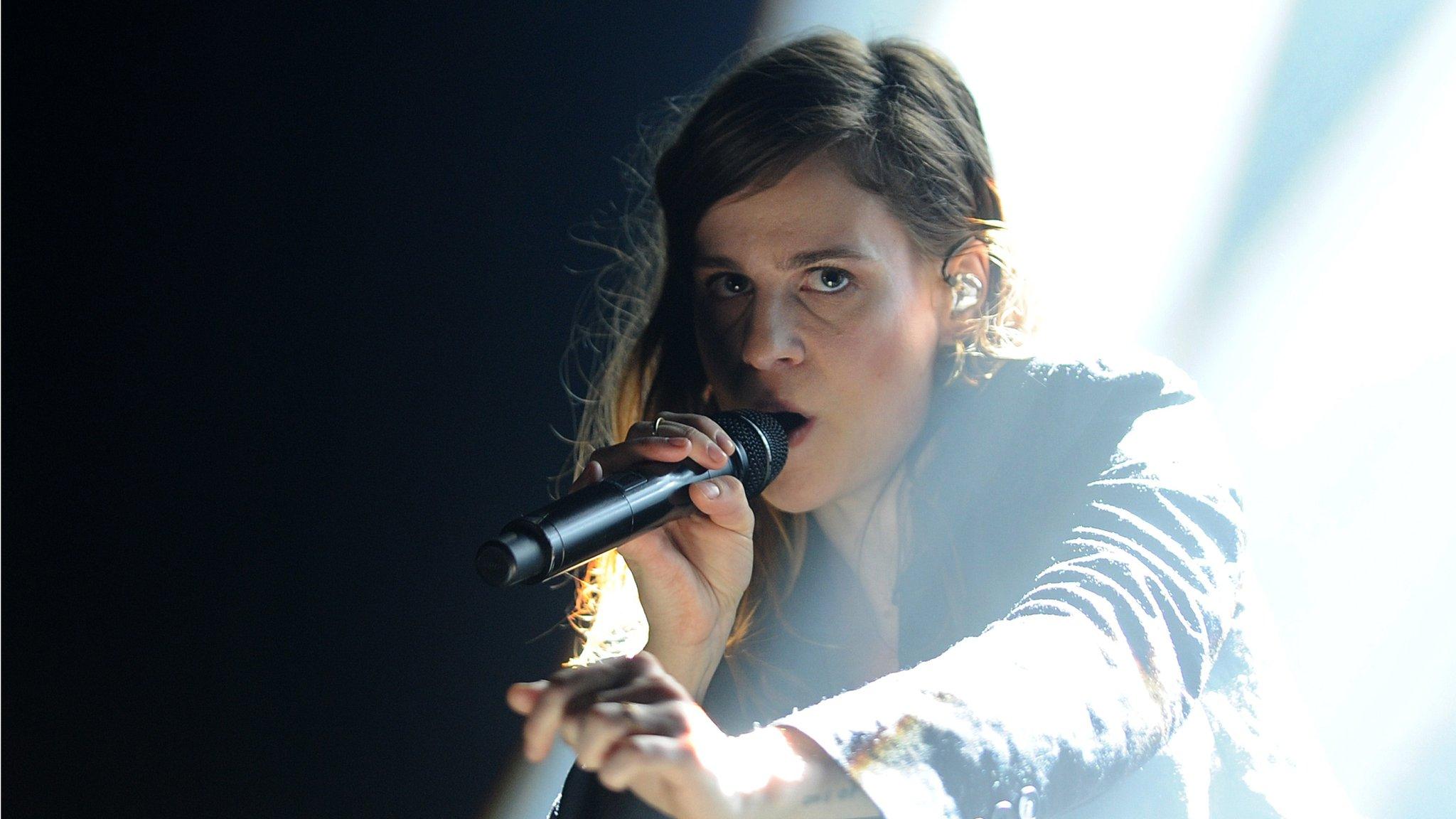Christine and the Queens: 'I decided to stop apologising'
- Published
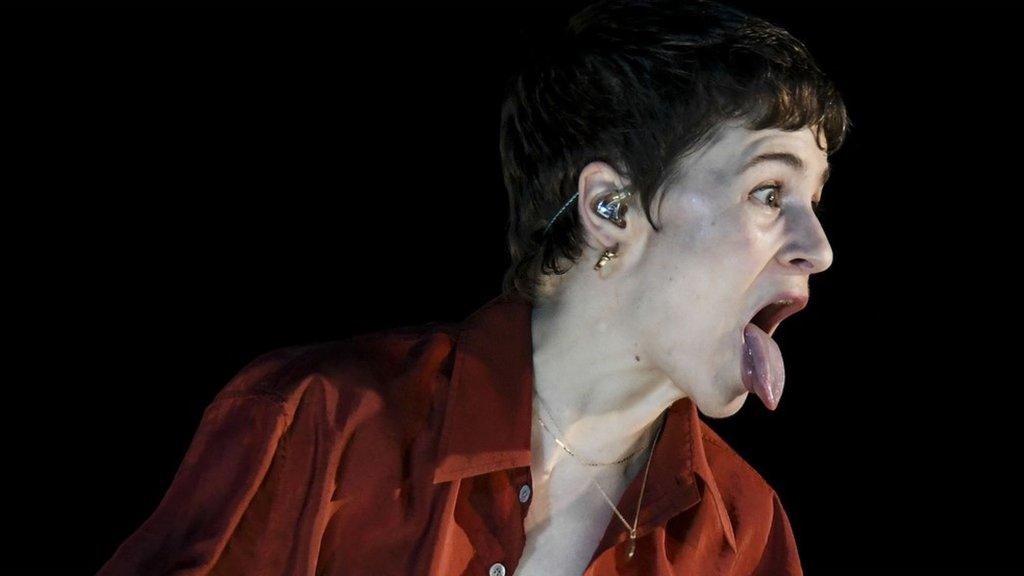
Heloise Letissier: "Since I started, it's been non-negotiable: I'm going to be brutally honest."
There aren't many pop shows like the one Christine + The Queens is putting on at festivals around Europe this summer.
Sparse and theatrical, it sees the French singer tangle and tussle with her dance troupe, as she brings to life songs of non-conformity and sexual awakening.
Amidst the spartan lighting and plumes of smoke, the muscular, gender-fluid performers occasionally resemble a Caravaggio painting - which, it transpires, is the whole point.
"I wanted to work the show like a painting," says Chris. "The fireworks create smoke, so it's almost like painting by explosion."
"When I first suggested it, my tech guys wanted to kill me, but maybe it's the fireworks that will kill me in the end," she adds, laughing. "That would be a fantastic gig: She died! She combusted into spontaneous fire!"
She's joking, of course, but Chris's shows generate enough heat to power a small village. At one point, a dancer even starts smoking - not with a cigarette pressed to their lips, but with literal smoke billowing from beneath their clothes.
There are moments of intense sadness, too. On What's Her Face, a song about how Letissier still carries the loneliness of the school playground everywhere she goes, she removes her shirt and turns her back to the audience, isolated and vulnerable amongst a crowd of adoring fans.
But the star emerges liberated and unapologetic, comfortable in her skin, shrugging off expectations.
"This is a safe space, free of all judgement," she announced as she headlined Glastonbury's Other Stage in June. "Because if there's no judgment, then anything can happen".
BBC News caught up with the singer, whose real name is Heloise Letissier, before the show to discuss her "brutally honest" lyrics, and why she "stopped apologising" for making music on her own terms.
Allow YouTube content?
This article contains content provided by Google YouTube. We ask for your permission before anything is loaded, as they may be using cookies and other technologies. You may want to read Google’s cookie policy, external and privacy policy, external before accepting. To view this content choose ‘accept and continue’.

It's eight hours until you headline this stage. How will you fill the time?
It's a good question, because the odd part of being a performer is that you spend the whole day waiting for night to happen.
I wish I was someone cool who could just enjoy the other gigs and wander around and have a good time; but I'll just be in my dressing room, sitting, listening to music and concentrating on the show.
And afterwards?
After the show, actually, I've given everything so I'm just, like, having a herbal tea. I have to be honest with you, the performance is so important that before and after doesn't really matter.
You go to some dark places. Are you drained by the end?
Yes, but it's also cathartic. When I was younger, I was always trying to hide the fact that I was very sensitive or fragile, and it was exhausting to hide it. But now that I'm embracing it, it really feels empowering.
Allow YouTube content?
This article contains content provided by Google YouTube. We ask for your permission before anything is loaded, as they may be using cookies and other technologies. You may want to read Google’s cookie policy, external and privacy policy, external before accepting. To view this content choose ‘accept and continue’.
A song like Don't Matter tackles subjects like anorexia and self-loathing that are atypical for pop music. What led you down that path?
Since I started to write my first song, it's been non-negotiable: I'm going to be brutally honest.
Christine and the Queens was born out of a crazy desire to finally accept everything and own everything about myself including the dark thoughts, including sadness, including the impossibility of fitting in. And I wouldn't shy away from that… which creates a weird balance.
And honestly, you know, Christine and the Queens was also borne out of something that happened between me and drag queens [she was nursed out of depression by a troupe of drag artists, external after a catastrophic break-up in her early 20s]. Christine is a drag character - it's really generous and fun and entertaining, but it's borne out of wounds.
Drag queens always have stories of their sadness - but they turn it into something that can be shared, and I think that's something that can be really powerful.
You've been called a spokesperson for the LGBT community. Is that a label you're comfortable with?
I think it's healthier not to see yourself as a spokesperson for anything. As an artist, I do believe in visibility, in speaking out. I believe in that very much. But it's good not to think of yourself as a role model, because it can become so solemn; and a bit pretentious also.
And restrictive, I guess?
I think so. It's the end of that brutal honesty we were talking about.
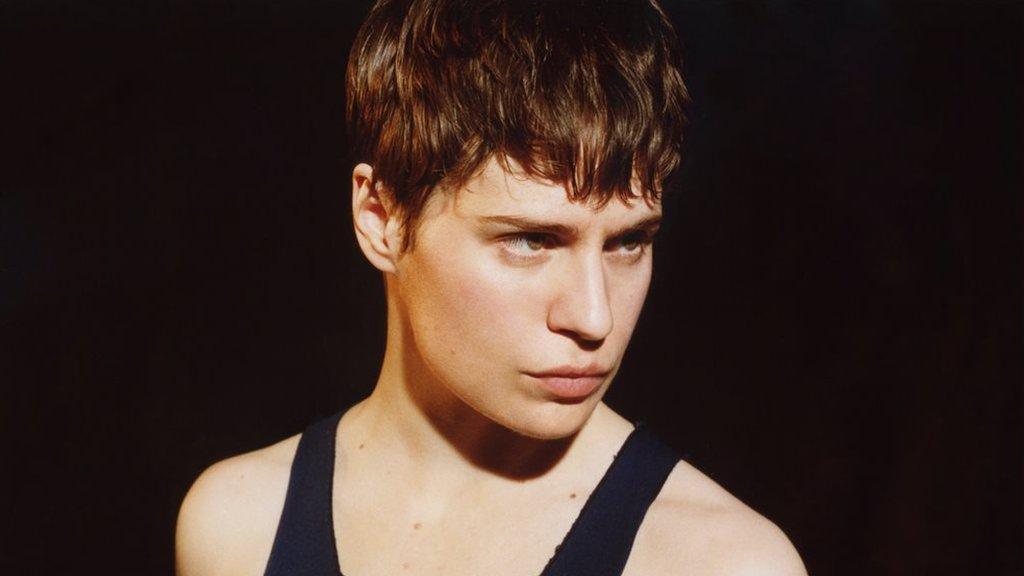
The singer, who identifies as pansexual, deliberately blurs masculine and feminine traits
Glastonbury made great strides towards gender equality this year, but you're the only female headliner on the two main stages. What can be done to get women further up the bill?
I recently did Primavera and that festival was 50/50. It was really an important moment when the line-up came out and we realised. It seems like the more we move forward, the easier it becomes to look back and see how we were lacking equality before.
It's not natural yet. It's not reflex yet. We have to talk about it, think of it, be careful of it; and I think we're getting towards the right direction. The pop landscape now is filled with different representations of femininity, which I appreciate. You have Solange, you have Billie Eilish, you have Beyoncé. Many different ways to be a woman in the industry, and I think that's really cool.
You've named three female headliners right there.
Absolutely. Beyoncé headlined Glastonbury already, didn't she?
Yes, and Billie Eilish is playing just before you today.
She represents something more rough around the edges, less polite. It's a form of femininity I actually do like.
The next step, would be to get more women in technical jobs - like female sound engineers, female producers.
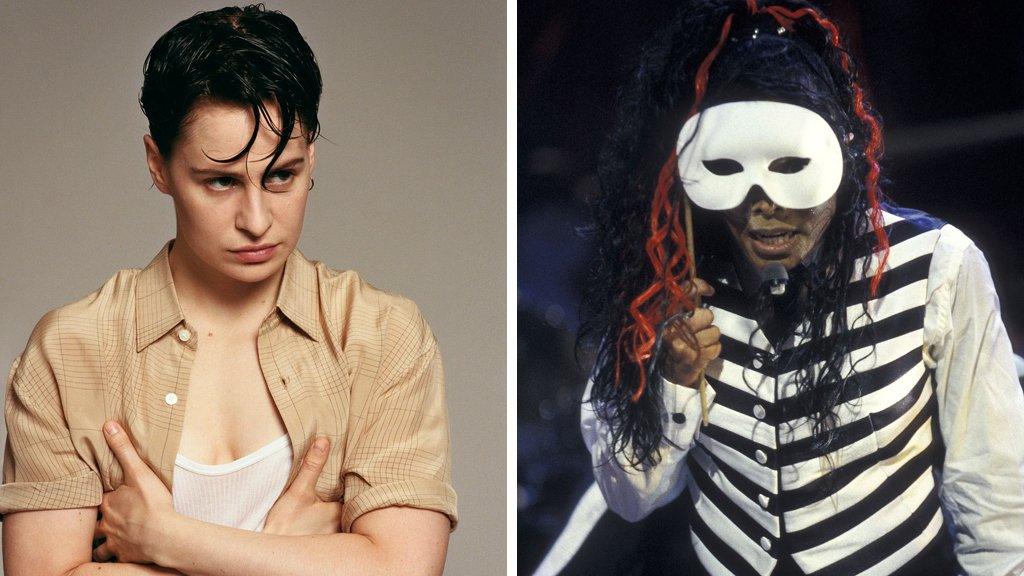
Chris's self-titled second album was partly inspired by Janet Jackson's soul-searching Velvet Rope
You've actually self-produced both your albums. Is that simply because the music is so personal?
It's just natural. When I write a song, I always start with the production - building a beat, an aesthetic. I don't have a demo with some piano chords and a melody, it's a fully-shaped song already. So then I just have to finish the production as it is.
Actually, at one point, because I was made to feel self-conscious about it, I was like, "OK, I'm going to try producing with other people," but it wasn't working. I kept losing the essence of the track because it was already produced with a clear vision. At some point I decided to stop apologising for that. I like producing. I like to think about sounds and textures.
Talk me through the making of 5 Dollars. How did you achieve such a unique sound?
I had an obsession with Bruce Springsteen when I was writing the second album. I was like, "Oh, he knows how to write such tender, catchy melodies" and when I wrote 5 Dollars, I was searching for that type of melody that could be uplifting and sad at the same time.
And then for the production, I was actually thinking a lot about Arthur Russell - whose music is really sparse and fragile, but also really fierce. So it was like Bruce Springsteen and Arthur Russell. No biggie.
Allow YouTube content?
This article contains content provided by Google YouTube. We ask for your permission before anything is loaded, as they may be using cookies and other technologies. You may want to read Google’s cookie policy, external and privacy policy, external before accepting. To view this content choose ‘accept and continue’.
You've been sampling Janet Jackson's Nasty during your show. Was that Minneapolis sound a big influence, too?
I actually watched her Glastonbury set on BBC iPlayer while I was drinking my coffee this morning! But you're right, on my second record, Jimmy Jam and Terry Lewis's production on Control and The Velvet Rope - were very inspiring for me.
I don't think a lot of people realise how trailblazing The Velvet Rope was - Janet was talking about gender fluidity and LGBT rights, long before it became an accepted part of pop music.
That album is a masterpiece. Like you say, it's about gender fluidity but also depression, empowerment. You get to meet a whole woman in every facet she has, and it's not an easy listen because it doesn't give an easy answer.
At one point she's empowered and at another she's getting abused by a partner - but it's the same woman, trying to make a path in life.
It's a hugely feminist album and the production is amazing, so I was really inspired by that. I wanted to make an album that could be complex, also. I didn't want to give any easy answers about who I was, because I don't have any.
And that's the key, isn't it? No-one is the same person from one day to the next.
No. Exactly. And I mean, I like cheesy pop. I like pop that's just [sings] "Be the best person you can be!" But I want to use the pop vessel to tell stories that could be deeply relatable. Sometimes those stories aren't clear or easy - but life's like that.
Christine and the Queens is playing festivals throughout Europe this summer, and currently appears with Charli XCX on the single Gone.

Follow us on Facebook, or on Twitter @BBCNewsEnts. If you have a story suggestion email entertainment.news@bbc.co.uk.
- Published1 July 2019
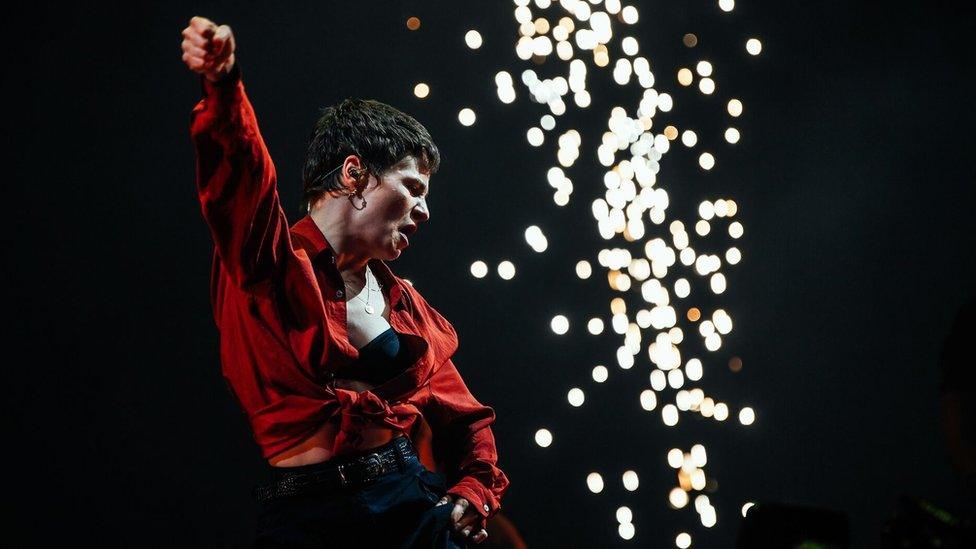
- Published28 September 2018
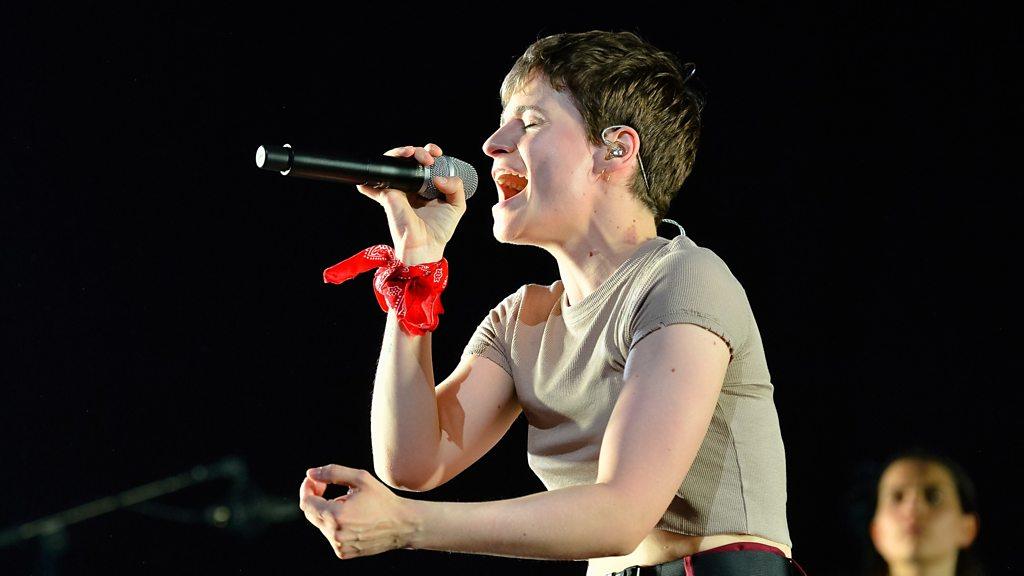
- Published6 December 2016
